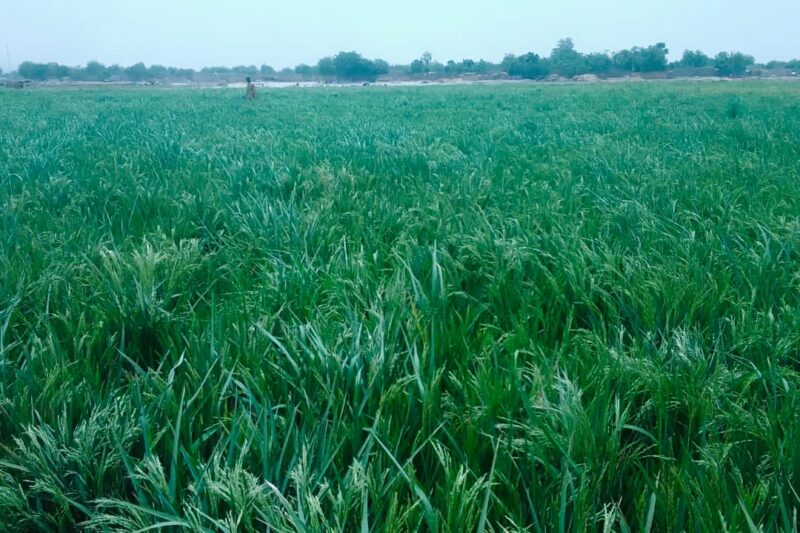Farmers say the birds – which migrate from the neighbouring countries of Chad, Cameroon, Benin and the Niger Republic – can wipe out hectares of crops within days or even hours.
Rice farmers in Zabarmari are pleading with the Borno State government to come to their aid urgently to stop invasions by quelea birds, which can destroy hectares of crops within days or even hours.
They say if the state does not act promptly, they could lose everything they planted, leaving them out of pocket and causing food shortages.
The migratory birds, mostly seed-eaters of both wild grasses and cereals – such as sorghum, rice, millet and wheat – come into Nigeria from the neighbouring countries of Chad, Cameroon, Benin and the Niger Republic.
According to the United Nations Food and Agriculture Organisation (FAO), the quelea is a short-tailed weaver and is “just like a dangerous parasite”.
Borno State is one of the states in the north of Nigeria where the invasion of quelea birds has been “identified as one of the main causes of food shortages”.
The birds’ ability to incur massive losses make them a serious threat to rice farmers, who mostly rely on traditional methods – covering the rice with fishing nets and hitting drums, shouting, and waving their arms, or planting handmade scarecrows – to combat the menace before the birds can destroy everything.
But these methods are not effective. Farmers say the government needs to send helicopters to conduct aerial spraying to get rid of the birds, although some farmers question the safety of the toxic chemicals on rice crops.
Zabarmari – in the Jere Local Government Area – is the largest rice-producing community in Borno State.
Rice farmer Bello Usman told RNI that quelea birds had already destroyed at least half his crop.
“Quelea birds invaded my farmlands in large numbers. They have already ravaged many hectares. We are counting our losses.
“Farmers in Zabarmari are calling on the government to tackle the birds’ invasions before we lose everything. Spraying the crops is the most effective method to get rid of the birds. We don’t have much time to waste. The authorities must act swiftly.”
Yakubu Abubakar said all farmers in the community were under threat.
“The quelea birds have destroyed between five to 20 hectares of my farmlands where the rice is already at ripening stage. The crops should soon be harvested but most of the produce has been eaten by the birds.
“Most farmers have already lost huge amounts of money because of the birds.
“Some farmers spent more than ₦5 million. They will be lucky if they get even ₦2 million in return because of invasions by the birds.”
Sa’idu Mohammed said rice farmers in Zabarmari struggled each year to control the destructive birds.
“We struggle in vain because there are just too many birds to deal with. They nest nearby in their thousands.
“They invade our farms at about 6am and then disappear around 12 noon. They return at around 5pm.
“We try to chase the birds by scaring them away but they just come back.
“Sometimes we employ people to guard our crops. They run through the crops, shouting and waving their arms, and beating drums. But it’s not very effective because you can’t carry on like that for more than an hour. It’s exhausting.
“We have tried to scare them with scarecrows made of sticks covered with brightly coloured plastic. But the birds are smart and they soon realise that there is no human movement. After about two days they return.
“We use fishing nets and hit drums to distract the birds to stop them descending on our crops. But fishing nets are expensive and we cannot afford to cover too many hectares. Individually, we also cannot afford to employ modern techniques using helicopters to spray pesticides. That’s why we are begging the government to come to our aid.”
Mohammed said the birds sometimes invaded at night.
“Farmers cannot spend the whole night trying to protect their crops. Apart from the birds, they are afraid of attacks by armed men who operate in the nearby forests. In December 2020 alone, 70 farmers were killed in attacks by insurgents. Since then, many more farmers have been killed or wounded.
“If you stay at home the quelea birds will destroy your crops and if you go to the fields you will be killed by insurgents.”
Mallam Isa Bukar Kumshe, a senior lecturer at the Mohammet Lawan College of Agriculture in Maiduguri, said quelea birds are small weavers that are native to sub-Saharan Africa.
“They are notorious for the damage they inflict on small-grain crops within the Lake Chad region.
“They primarily feed on seeds but they also eat insects when preparing for breeding or migration.
“Their survival depends on a steady supply of grass seeds. But when they are unable to find sufficient grass seeds, the quelea will attack crops. They can destroy many hectares in days or even hours.”
Kumshe said the birds posed a significant threat across large parts of sub-Saharan Africa, leading to substantial economic losses and food shortages.
“Normally the birds arrive – often with locusts and grasshoppers – from neighbouring countries. They migrate from place to place based on weather patterns.
“The birds come to Zabarmari around this time of year because most of the cereal crops are ripening. There is abundant green grass, as well as plenty of crops and water.
“It is imperative for the state government to intervene as soon as possible to save the harvests. The birds need to be controlled. If the farmers cannot harvest their rice they will lose money. There also could be food shortages.
“The rainy season is getting closer and the farmers will soon start preparing for seasonal agriculture activities.”
SHETTIMA LAWAN MONGUNO









